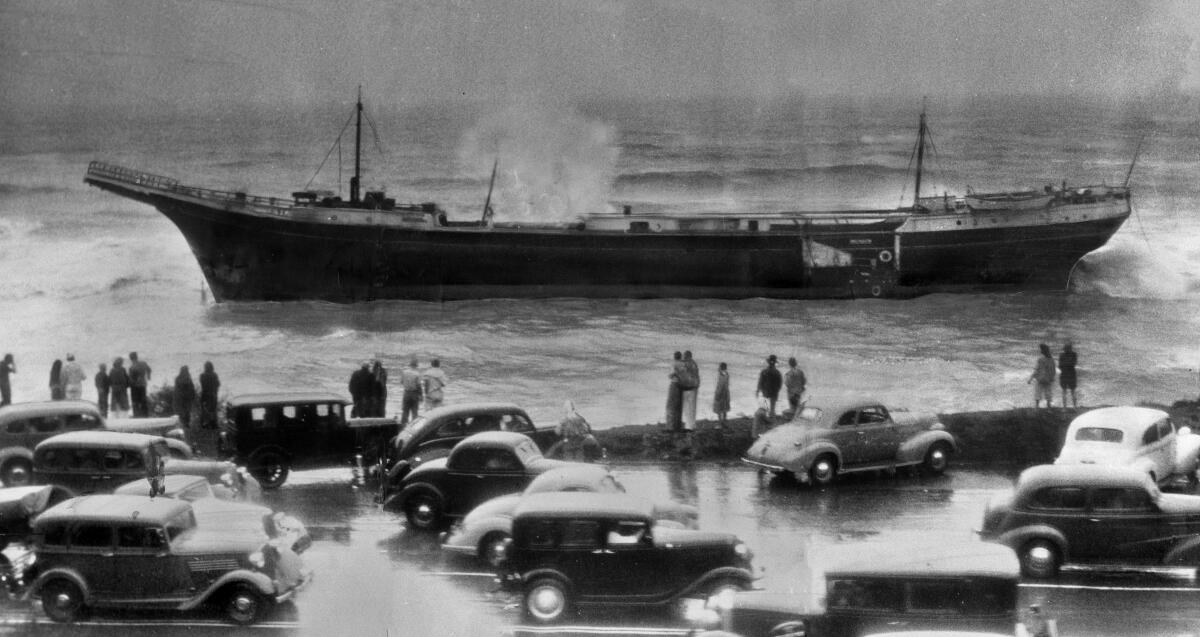A Word, Please: Did the ship founder or flounder? Maybe both

- Share via
“The ship floundered in rough seas and eventually sank.”
“The ship floundered in the swells off of the Outer Banks for a while before breaking apart.”
“When a cargo ship floundered on the shore, it was often considered providence.”
When I searched Google recently for wrong uses of the verb “flounder,” I found a lot of flubs. Or did I? On second glance, I’m not sure any of the errors I caught by searching the term “ship floundered” were actually errors. On the contrary, the error may have been mine for believing the grammar scolds who complain that almost no one uses “founder” and “flounder” correctly.
“People commonly confuse ‘flounder’ and ‘founder’ because they sound similar and have similar spellings,” one blogger warns. “The words ‘flounder’ and ‘founder’ are easily confused,” says another. And there are lots more where these two came from. For the most part, these online language commenters are right: The verbs “flounder” and “founder” are easy to confuse. But what’s remarkable is that, at least in a nautical context, you’re likely to get them right even if you’re confused.
Here’s a closer look.
“Although the figurative sense of both words is ‘to go wrong,’ the literal sense evokes different images,” says the Chicago Manual of Style. “To flounder is to struggle awkwardly, as though walking through deep mud (the professor glared while the unprepared student floundered around for an answer). To founder (usually in reference to a boat or ship) is to sink or run aground (the ship foundered on the rocks).”
In the meaning of struggling or sinking, “flounder” appears to have entered the language in the late 16th century, but no one knows where it came from. Some etymologists think it may have evolved as a variation of the verb “founder.” It could also be related to the Dutch word “flodderen,” meaning to flop about. It’s probably not related to the fish flounder, which is interesting because the way fish flop around on the deck of a boat is a perfect illustration of the verb “flounder.”
Grammar expert June Casagrande writes you don’t need to stress about commas in certain situations when you can just them or forget them.
The verb “founder” is better understood. It started showing up in English in the early 14th century as a transitive verb meaning “to send to the bottom.” Later that century, it started cropping up as an intransitive verb meaning “to sink or fall.” Its roots lie in the old French “fondrer,” meaning to collapse, to submerge or to sink or fall to the bottom. That means it’s also related to the modern French “fondrier,” which itself seems to have emerged from the 12th-century Latin “fundus,” meaning a bottom or foundation of something.
So at every stage of its evolution, the verb “founder” has to do with sinking to the bottom of something or the bottom itself.
People don’t often make the mistake of saying “founder” when they mean “flounder.” To borrow the Chicago Manual of Style’s example above, it seems no one’s inclined to say, “The unprepared student foundered around for an answer.” It’s only “flounder” that tends to show up where it’s not intended, most often referring to sinking boats.
So when someone says that a ship floundered, it’s easy to assume they mixed up the words. But, in many cases, a closer reading suggests that maybe they didn’t. For example in “The ship floundered in rough seas and eventually sank,” the verb “founder” would be illogical — the equivalent of saying “the ship sank and eventually sank.”
“The ship floundered in the swells off of the Outer Banks for a while before breaking apart” may not be a mistake either, because ships can both flounder and founder. And if these writers meant that the vessel struggled awkwardly in the water, then they chose their words just right.
June Casagrande is the author of “The Joy of Syntax: A Simple Guide to All the Grammar You Know You Should Know.” She can be reached at JuneTCN@aol.com.
All the latest on Orange County from Orange County.
Get our free TimesOC newsletter.
You may occasionally receive promotional content from the Daily Pilot.






